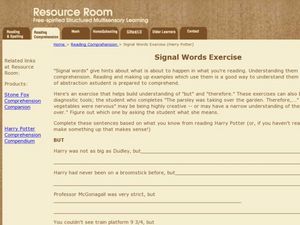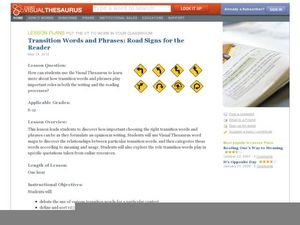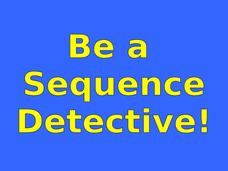Curated OER
Signal Words: But and Because
Use two of the most common signal words to teach your learners how to predict what might happen next while reading texts. Although there are many, but and because are the signal words selected for this sheet. Consider pointing out how...
Institute for the Professional Development of Adult Educators
Using Context Clues with Signal Words
When you come across an unfamiliar word in a text, do you skip it and move on? Practice using context clues to identify words you don't know with a thorough set of language arts lessons. The resource reinforces close reading and critical...
Read Works
Signal Words in Expository Text
Signal words are one way that authors make the relationships between their ideas clear. Allow your learners the chance to investigate cause and effect in texts by identifying signal words. They locate and analyze cause-and-effect...
Curated OER
Signal Words Exercise: Harry Potter (But)
Have your class complete 20 sentences about Harry Potter that contain the signal words "but" or "therefore." If students have not read any Harry Potter books they can make something up that makes sense.
Curated OER
Signal Words Exercise 2
Learners complete 20 short answer questions using the signal words but and because in a story. This is related to the Harry Potter books but may be completed without reading them.
Curated OER
Can You Get the Signal?
What is a signal word? Recognizing these words is an important step in both reading and writing formal text. Review a list of signal words (provided and organized into specific categories), and then have your class play a game to...
Curated OER
Signal Words
What is a signal word, and why is it important? Since signal words are so important in a text, provide your learners with the list provided here. There are also three sample exercises provided here; they focus on the signal words but,...
Curated OER
Signal Words: Exercise 3 Harry Potter
Practice predicting what will happen next in a reading by learning to identify words that give hints about what is going to happen in a story. Students complete 12 sentences that contain the word despite with information about events in...
Curated OER
Transition Words for Better Writing
Improve learners' writing, comprehension, and analytical thinking by teaching the use of transition words.
Curated OER
Compare and Contrast Two Settings in One Text
Look for the signal words! Scholars get both instruction and practice comparing and contrasting. Although it is completely scripted, it can also serve as a detailed outline. Demonstrate this as you read a passage (included) and search...
Jumpstarting Journeys
Vowel Digraph Activities for au and aw
It can be awfully hard teaching young children how to read, but this phonics resource will make the job a little easier. Focusing on the au and aw vowel digraphs, this collection of engaging activities teaches beginning readers how to...
Curated OER
Transition Words and Phrases: Road Signs for the Reader
Therefore! However! Furthermore! Explore the power of transition words and phrases. Signal your readers by suggesting the relationship between different thoughts or points. Help them demonstrate an understanding of word relationships.
Curated OER
Connectors Exercise: Transitional Words
Transitional words and phrases make writing smooth and ease oral fluency. This resource gives English learners a chance to practice using common connecting words and phrases like above all, firstly (sic), instead, etc. Answers are...
New York State Education Department
English Language Arts Examination: January 2018
Excerpts from classic novels make great material for standardized tests. A sample English language arts examination, part of a larger set of assessments, mixes excerpts from classic novels and more modern texts. The test includes three...
New York State Education Department
English Language Arts Examination: June 2017
Plants prefer classical music to rock and roll. That's one of the claims in an informational passage that makes up part of a set of standardized assessment questions. The set is part of a larger collection of English language arts tests...
New York State Education Department
English Language Arts Examination: August 2017
Reading and comprehending a poem is a lot different than doing the same for a piece of fiction or an informational text. As part of a sample English language arts examination, readers put their skills to the test by reading passages in...
TED-Ed
How to Speak Monkey: The Language of Cotton-Top Tamarins
Tamarin monkey language can be categorized by stem upsweep, duration, peak frequency, and frequency change. Although other complex terminology is used to describe the 38 calls of this species, the video is easy to follow and a...
Curated OER
Lesson 1:Cause and Effect Signal Words
Give your class a strategy they can use when trying to identify cause and effect relationships in text. You'll model, and they'll practice using signal words to quickly identify cause and effect. They focus on signal words such as, if,...
Curated OER
Identifying Opinions with Signal Words
First graders identify opinions within a text. In this language arts instructional activity, 1st graders discuss the definition of opinion. Students identify words that signal opinions and work together to identify opinions within the text.
Roanoke County Public Schools
Be a Sequence Detective!
Authors are constantly leaving clues that help the reader to understand the sequence of events in a story. Teach young readers how to pick up on these key temporal words and phrases with this slide show. After an introduction to commonly...
TV411
Dependent and Independent Clauses Join Forces
Young grammarians are often confused by clauses, especially the difference between dependent and independent clauses. Clarify the confusion with a color-coded worksheet that clearly defines and illustrates the differences and then gives...
Curated OER
Use Common Roots and Affixes When Attached to Known Vocabulary
After a brief review of roots and affixes, partners are asked to choose a root, find words built on that root, and create a Christmas ornament decorated with these words. Beware the typos!
Curated OER
The Use of Signal Words in Writing
Students examine the use of transition or signal word to create good paragraph organization.
Curated OER
Sequence, Predict, Infer: Pink and Say
Practice sequencing with your 2nd graders via Patricia Polacco's Civil War book Pink and Say. Begin with a blindfold and a bag of mystery items. Connect their use of clues to identify what they can't see with the skill of making...

























